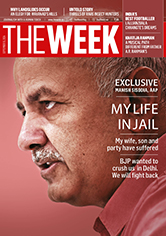I thought Manish Sisodia was a wrongdoer, but after reading your interview with him I no longer think so. He seems to have been wrongly implicated in the case (‘Out of jail... not out of touch’, September 15). But then why did he have to stay in jail for 17 months? There is no smoke without fire.
The BJP leaders, under Amit Shah, were hell-bent on paralysing the AAP government in Delhi. All this will not affect the AAP, which will come back to power.
Vyom Prakash,
On email.
Atishi is the only one capable to be the chief minister of Delhi. She is the only one who seems to be straightforward among the lot. I lost respect for Arvind Kejriwal the day his wife came out and addressed a rally when he was in jail. Is the AAP a family party? No, it is not. Sisodia, Kejriwal and others should make way for Atishi.
Krishnan Nandakumar,
On email.
The AAP is no longer the AAP that it used to be, with most of its leaders in jail. People have lost respect for the party. They win the assembly elections in Delhi only because of populist measures and freebies. Sisodia and Kejriwal became very ambitious. They know how to fool the people.
Nikhil Sharma,
On email.
Kejriwal is no longer helping the AAP’s image. His reputation for sincerity and honesty has diminished. For the AAP to succeed, he must ensure that both his family and Sisodia distance themselves from the party. The leadership should be handed over to Atishi.
Renuka Kothari,
On email.
Balance development with ecological challenges
The recent landslides in Wayanad expose the government’s failure to tackle its well-known ecological vulnerabilities (‘Silent screams of Wayanad’, September 15). Unregulated tourist boom has also played a key role in the ‘ghatastrophe’. This factor deserves all the more attention, because it is wreaking havoc across several tourists hotspots in the country.
Governments have no interest in protecting nature. Businesses profit from close relationships with state power through an anti-competitive regulatory environment, direct government bounty and corruption. This includes obtaining permits, government grants and tax benefits.
As recommended by the Western Ghats Ecology Expert Panel, Kerala must discourage engineering projects in ecologically sensitive areas and constitute empowered expert committees to study the viability of alternate projects. Kerala should balance development needs with environmental challenges.
Governments will have to change their priorities. The decade-long inaction is a typical example of how other interests prevail over the environment. While humans gain from it in some way or other, the area only faces loss after loss. What took centuries to build, we are ruining impulsively.
Sanjay Chopra,
On email.
I am scared after reading the interview of Madhav Gadgil (‘The hills are becoming more and more fragile’, September 15). Limiting construction and mining activities and regulating tourism will help in preserving hill stations like Wayanad. A tragedy like the one we saw should never happen. More and more trees will help prevent soil erosion. The Kerala government should immediately stop the tunnel project connecting Wayanad with Kozhikode. It is a recipe for disaster.
Anupa Nambiar,
On email.
Promoting eco-tourism initiatives is the need of the hour. Illegal logging and quarrying should not be tolerated. We cannot afford one more Wayanad in Kerala. Palakkad, Idukki and Kasargod are full of hills, and are prone to landslides. Development should not be at the cost of environment.
Harsha Venugopal,
On email.
Stop this ‘show’ business
Veteran actress Zeenat Aman’s comment (‘Point blank’, September 15) calls out the cinematic culture of India where the film industry has become a ‘show business’. With bodies of actors being objectified and their private lives commodified, trends such as predatory casting, item songs and insensitive storylines to win over the box-office must end. Disappointingly, the Hema Committee’s report has proved that society has not changed since the times Zeenat acted.
Aparna Vats,
On email.
Relatable distress
K.C. Verma’s column makes for an interesting read. Incessant income tax reminders and KYC renewals are making our lives bitter (‘Otherwise cracked’, September 15). While tax authorities are busy sending reminders, they are very much lethargic in disposal of appeals for refunds. Moreover, every year, they ask for some information that is already available with them.
Ravindran Talapan,
On email.
Foreign policy’s fine print
Congrats on publishing Mani Shankar Aiyar’s bold and informative piece comparing the foreign policy of Nehru’s 10 years with Modi’s (‘Mani-festo’, September 15). The article’s conclusion is absolutely true. Foreign policy, unlike domestic politics, is not theatrics, jumlas, rhetoric and self-patting, but a serious statecraft based on a policy framework in the nation’s interest and the guts to stand firm on it. The opposite may enthuse the top leader’s domestic fans, but do not serve national interest nor earn international acclaim.
C.K. Saseendran,
On email.

